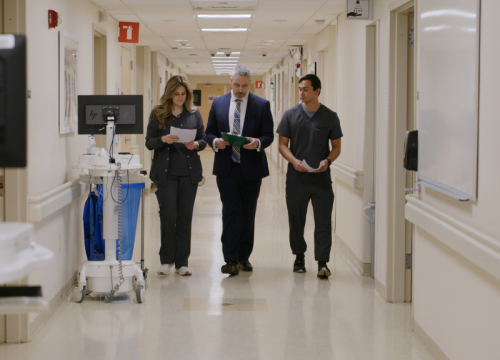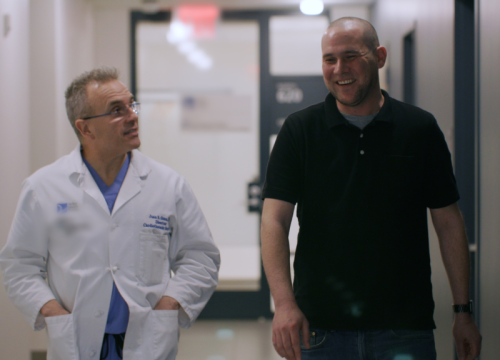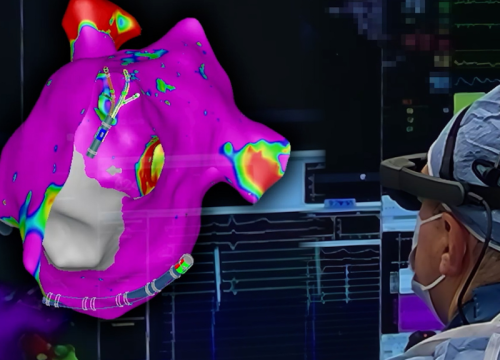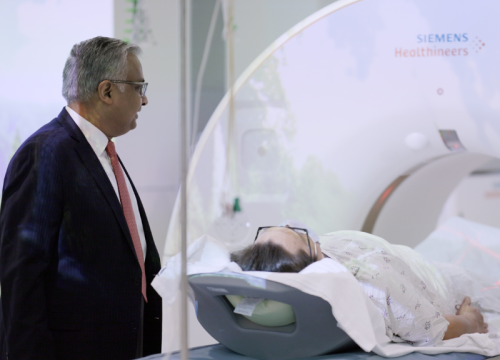Heart palpitations are sensations that may feel like your heart is skipping a beat, fluttering or pounding. They can happen at any time and may not last long — usually a few seconds or minutes.
While you may find heart palpitations worrisome, they can be quite common and usually harmless. However, they can also be a sign of arrhythmia (an irregular heart rhythm) that typically requires medical treatment.
At Valley, our cardiologists and electrophysiologists work with you to determine the underlying causes of your heart palpitations. We can then recommend the appropriate treatment to prevent or control future palpitations.
What Do Heart Palpitations Feel Like?
You may feel heart palpitations in your chest, neck or throat. They can feel like your heart is:
- Skipping or missing a beat
- Fluttering
- Flip-flopping
- Pounding
- Beating too hard
- Racing or beating too fast
When to Worry About Heart Palpitations
Occasionally, heart palpitations can signal more serious heart problems. So, you should talk with your Valley provider right away if you have heart palpitations that occur with these other symptoms:
- Dizziness or fainting
- Confusion
- Difficulty breathing
- Chest pain or tightness
What Causes Heart Palpitations?
Common causes of heart palpitations include:
- Strong emotions, including anxiety or stress
- Physical activity
- Caffeine, alcohol or nicotine
- Cocaine or other illegal drugs
- Medications that treat high blood pressure or heart disease
- A history of heart disease
- Certain medical conditions, including anemia, low blood pressure and thyroid disease
Heart Palpitation Diagnosis at Valley
If you’re having heart palpitations, talk to your doctor. They may first refer you to a cardiologist to help diagnose why you’re having heart palpitations.
If your doctor suspects arrhythmia is the root cause of your heart palpitations, they may then refer you to an electrophysiologist. An electrophysiologist is a type of cardiologist who specializes in diagnosing and treating heart rhythm conditions.
What to Expect at Your First Electrophysiology Appointment at Valley
At your first appointment, your electrophysiologist will:
- Perform a physical exam.
- Ask about your symptoms.
- Take a detailed health history.
They may also order tests to check for heart arrhythmia conditions.
Diagnostic Testing for Palpitations
Your electrophysiologist may order tests to evaluate your heart’s electrical activity (which controls your heartbeats). We will discuss which testing or ambulatory monitoring is most appropriate for you. Some tests may include:
- Electrocardiogram (ECG): During this procedure, electrodes (small, sticky patches) attached to your chest, arms and legs record your heart’s electrical activity. The electrodes connect to a machine that produces a wave pattern that shows how normally your heart is functioning.
- Smartphone ECG monitors: Many ECG monitoring devices can work with your smartwatch or smartphone to monitor and record your heart rate. With these devices, you may also be able to log infrequent palpitations yourself when you feel them.
- An implanted loop recorder: During a minor procedure, a cardiologist implants a device the size of a paperclip under the skin on your chest. You can often go home the same day. This device can capture your heart’s irregular electrical activity when external monitors worn for shorter periods of time may not.
Typically, these tests help us get to the root cause of your heart palpitations. From there, we’ll work with you to develop a treatment plan that fits your lifestyle and needs.
Heart Palpitations Treatment at Valley
We will base your treatment plan on the cause and frequency of your heart palpitations.
Palpitations without arrhythmia: If you have infrequent heart palpitations that are not caused by arrhythmia, we may recommend lifestyle changes. This could include:
- Avoiding alcohol, caffeine and nicotine.
- Getting evaluated for sleep apnea, if you snore. (Research shows that patients with sleep apnea are more likely to develop heart arrhythmias.)
- Managing stress through yoga, deep breathing and relaxation exercises or meditation.
Palpitations with arrhythmia: If you have frequent palpitations or heart arrhythmia, we may recommend lifestyle changes and medical treatment to correct the issue. This could include medication, catheter ablation (a type of heart ablation) and other options.
Why Choose Valley for Heart Palpitations Care?
- Quick access to heart palpitations care: We understand that it can be stressful when you’re having heart palpitations. That’s why the Valley electrophysiology team offers same-day appointments to quickly get to the root cause of what’s causing your palpitations.
- Accurate diagnostic testing: At Valley, we lead and participate in studies to make sure we’re using the most advanced and accurate tests to find the root cause of your heart palpitations. For example, we can advise you on the best type of Holter monitor based on national data on diagnostic accuracy.
- Extended Holter monitoring: With recent technical advances, you can now wear Holter monitors for as long as four weeks, as opposed to days. When you wear it longer, our team can gather more comprehensive data about your heart’s electrical activity. And that helps us better pinpoint the cause of your palpitations.
- Care from multiple services: We work with other Valley specialists to address the possible triggers of your palpitations. For example, our sleep medicine specialists can help address sleep-related problems, like sleep apnea. And our behavioral cardiologists can help you to better manage stress.
- Helping you learn about heart palpitations: We believe the more you know and understand about your condition, the better your care journey. At Valley, we partner with you to fully explain possible causes of your heart palpitations and how to monitor them. Together, we can then develop a treatment plan to prevent future palpitations or address your arrhythmia.

















